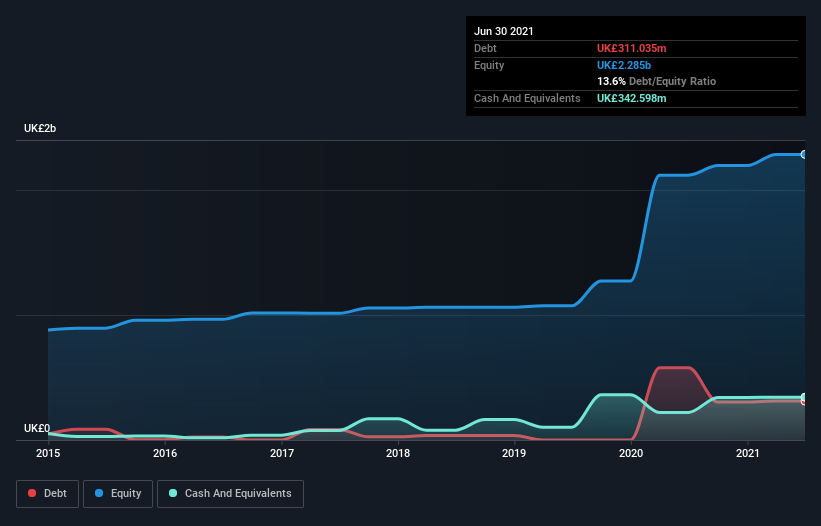David Iben put it well when he said, 'Volatility is not a risk we care about. What we care about is avoiding the permanent loss of capital.' When we think about how risky a company is, we always like to look at its use of debt, since debt overload can lead to ruin. As with many other companies Vistry Group PLC (LON:VTY) makes use of debt. But the real question is whether this debt is making the company risky.
What Risk Does Debt Bring?
Generally speaking, debt only becomes a real problem when a company can't easily pay it off, either by raising capital or with its own cash flow. If things get really bad, the lenders can take control of the business. However, a more usual (but still expensive) situation is where a company must dilute shareholders at a cheap share price simply to get debt under control. Of course, debt can be an important tool in businesses, particularly capital heavy businesses. When we think about a company's use of debt, we first look at cash and debt together.
See our latest analysis for Vistry Group
What Is Vistry Group's Debt?
The image below, which you can click on for greater detail, shows that Vistry Group had debt of UK£311.0m at the end of June 2021, a reduction from UK£578.0m over a year. However, it does have UK£342.6m in cash offsetting this, leading to net cash of UK£31.6m.

A Look At Vistry Group's Liabilities
According to the last reported balance sheet, Vistry Group had liabilities of UK£934.5m due within 12 months, and liabilities of UK£556.1m due beyond 12 months. Offsetting these obligations, it had cash of UK£342.6m as well as receivables valued at UK£245.2m due within 12 months. So its liabilities outweigh the sum of its cash and (near-term) receivables by UK£902.8m.
While this might seem like a lot, it is not so bad since Vistry Group has a market capitalization of UK£2.66b, and so it could probably strengthen its balance sheet by raising capital if it needed to. But we definitely want to keep our eyes open to indications that its debt is bringing too much risk. While it does have liabilities worth noting, Vistry Group also has more cash than debt, so we're pretty confident it can manage its debt safely.
Better yet, Vistry Group grew its EBIT by 127% last year, which is an impressive improvement. That boost will make it even easier to pay down debt going forward. There's no doubt that we learn most about debt from the balance sheet. But it is future earnings, more than anything, that will determine Vistry Group's ability to maintain a healthy balance sheet going forward. So if you're focused on the future you can check out this free report showing analyst profit forecasts.
But our final consideration is also important, because a company cannot pay debt with paper profits; it needs cold hard cash. While Vistry Group has net cash on its balance sheet, it's still worth taking a look at its ability to convert earnings before interest and tax (EBIT) to free cash flow, to help us understand how quickly it is building (or eroding) that cash balance. Over the last three years, Vistry Group actually produced more free cash flow than EBIT. There's nothing better than incoming cash when it comes to staying in your lenders' good graces.
Summing up
While Vistry Group does have more liabilities than liquid assets, it also has net cash of UK£31.6m. And it impressed us with free cash flow of UK£326m, being 115% of its EBIT. So we don't think Vistry Group's use of debt is risky. The balance sheet is clearly the area to focus on when you are analysing debt. But ultimately, every company can contain risks that exist outside of the balance sheet. For instance, we've identified 1 warning sign for Vistry Group that you should be aware of.
At the end of the day, it's often better to focus on companies that are free from net debt. You can access our special list of such companies (all with a track record of profit growth). It's free.
New: Manage All Your Stock Portfolios in One Place
We've created the ultimate portfolio companion for stock investors, and it's free.
• Connect an unlimited number of Portfolios and see your total in one currency
• Be alerted to new Warning Signs or Risks via email or mobile
• Track the Fair Value of your stocks
This article by Simply Wall St is general in nature. We provide commentary based on historical data and analyst forecasts only using an unbiased methodology and our articles are not intended to be financial advice. It does not constitute a recommendation to buy or sell any stock, and does not take account of your objectives, or your financial situation. We aim to bring you long-term focused analysis driven by fundamental data. Note that our analysis may not factor in the latest price-sensitive company announcements or qualitative material. Simply Wall St has no position in any stocks mentioned.
Have feedback on this article? Concerned about the content? Get in touch with us directly. Alternatively, email editorial-team (at) simplywallst.com.
About LSE:VTY
Flawless balance sheet with reasonable growth potential.
Similar Companies
Market Insights
Community Narratives



